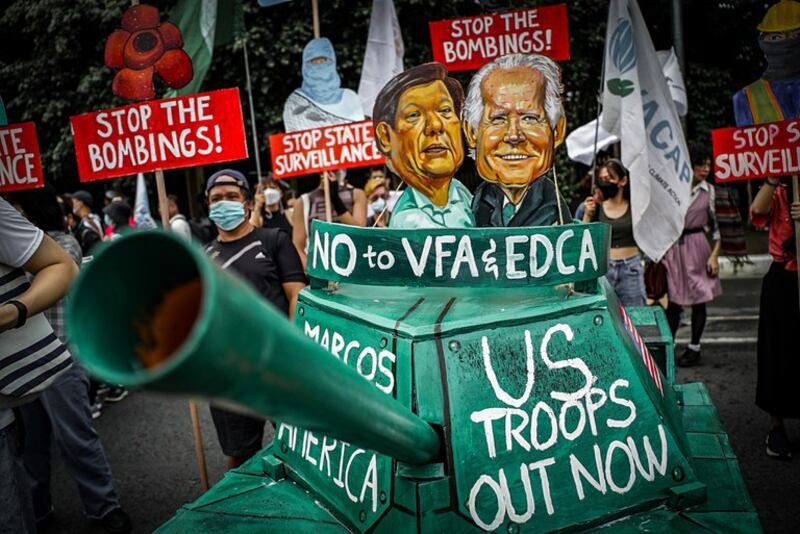President Ferdinand Marcos Jr. talked at length about protecting the Philippines’ sovereignty amid heightened territorial tensions with China in a speech to Congress on Monday about his first year in office.
Marcos said the Philippines would always follow international law – a veiled reference to Beijing, which has increased its encroachment into Manila's South China Sea waters and continued to harass Philippine vessels since he was elected as the country's leader in May 2022.
“Our journey to progress requires not only unity and social cohesion among our people. It is also imperative that our nation remains intact and inviolable, our sovereignty preserved,” Marcos said during his second State of the Nation Address, which lasted a little more than an hour.
Marcos noted that the Philippines would stick with the policy of being “a friend to all and enemy to none,” a strategy that, he said, has proven effective.
“We will protect our sovereign rights and preserve our territorial integrity, in defense of rules-based international order,” he said.
“With our national interest paramount, we will always pursue constant dialogue and diplomatic approaches to the resolution of any issue that may arise.”
Marcos, the namesake son of a late Filipino dictator, has stepped back from his immediate predecessor Rodrigo Duterte's strategy and repaired ties with the United States. Under Marcos' watch, the American military has been allowed to gain access to more Philippine military bases, as tensions between the U.S. and China build over Taiwan.
In May, Marcos became the first Philippine president in nearly a decade to conduct an official visit to the United States.
Marcos simultaneously has been careful not to alienate China, a key partner in Philippine economic growth, although his government has filed nearly a hundred diplomatic protests against Beijing over its alleged harassment in the contested sea region.

Marcos’ speech highlighted that his administration prioritizes protecting the country’s sovereignty, Don MacLean Gill, a Manila-based geopolitical analyst, told BenarNews.
“More importantly, and perhaps, as a veiled response to Chinese belligerence and expansive claims, Marcos Jr. reiterated Manila’s adherence in securing and preserving the rules-based order,” Gill said.
The address “highlighted and re-emphasized Marcos Jr’s commitment in prioritizing the Philippines’ territorial integrity, sovereignty, and sovereign rights amid the exacerbating geopolitical conditions of the region,” Gill said.
Meanwhile, about 5,000 protesters marched to the House of Representatives complex in Quezon City, Metro Manila, where Marcos delivered his State of the Nation Address. They were peacefully protesting some of his economic and foreign policies.
Renato Reyes, head of the nationalist group Bayan, said the Marcos administration was not doing anything to address the fact that the Philippines was in the midst of superpower rivalry in the region.
“In his vision of a Bagong Pilipinas [new Philippines], Marcos avoided the problem of U.S. military bases in the Philippines and China’s incursions in our exclusive economic zone and how we are caught between this inter-imperialist rivalry,” Reyes said in a statement.
ICC and drug war
Marcos also spoke about reforms to the police force, but said his government would not drop his predecessor’s war on drugs, adding “it has taken on a new face.”
Marcos faces questions over justice related to Duterte’s drug war that left about 8,000 suspected drug addicts and dealers dead, activists have said.
Last week, the International Criminal Court turned down a Philippine appeal to reject an investigation into the drug war. Reacting to that ruling, Marcos on Friday said that Manila would no longer deal with the ICC nor cooperate with it “in any way, shape, or form.”

In his speech to Congress, he did not directly talk about the ICC’s decision.
“We will relentlessly continue our fight against drug syndicates, shutting down their illegal activities and dismantling their network of operations,” Marcos said.
He said “unscrupulous law enforcers” involved in drug trafficking had been identified.
“I will be accepting their resignations,” he said, but did not add that he would order their arrest.
Cristina Palabay, secretary general of Karapatan, a human rights group which represents some of the drug-war victims in the ICC case, took Marcos to task for not talking about the court’s decision in his speech on Monday.
“The supposed new face of his anti-narcotics campaign is merely a rehash of tired, old PR lines that mean literally nothing in the context of the continuing extra-judicial killings in his drug war,” Palabay told BenarNews.
Economy faces global troubles
Addressing the economy, Marcos noted that global market conditions, such as the conflict in Ukraine and the extended effects of the COVID-19 pandemic continued to affect growth. But the economy had still performed well, he said.
The economy grew by a respectable 7.6% in 2022, and 6.4% in the first quarter of 2023. Inflation had eased too as the government continued to stabilize prices of basic commodities, Marcos said.
“On matters of the economy, there are many things over which we have no control,” he said.
“But over those where we do have control, we are doing everything we can,” he said, as he asked Congress to keep supporting the government’s fiscal reform programs, including the passage of several key tax laws.
But those who protested outside the House of Representatives and Reyes, of the group Bayan, said they were dissatisfied with the Marcos administration’s lack of attention to employment and labor.
“In his Bagong Pilipinas, there is no mention of national industrialization and sustainable job creation. There is no mention of a substantial wage increase for workers and employees. ... There were promises of local agriculture development, but these are undermined by the policy of importation of agricultural products,” Reyes said.
“Bagong Pilipinas … harps on grand promises but falls short of actual benefits for the people. In that respect, it is not so new after all.”
Camille Elemia, Jojo Riñoza and Basilio Sepe in Manila contributed to this report by BenarNews, an RFA-affiliated online news organization.
